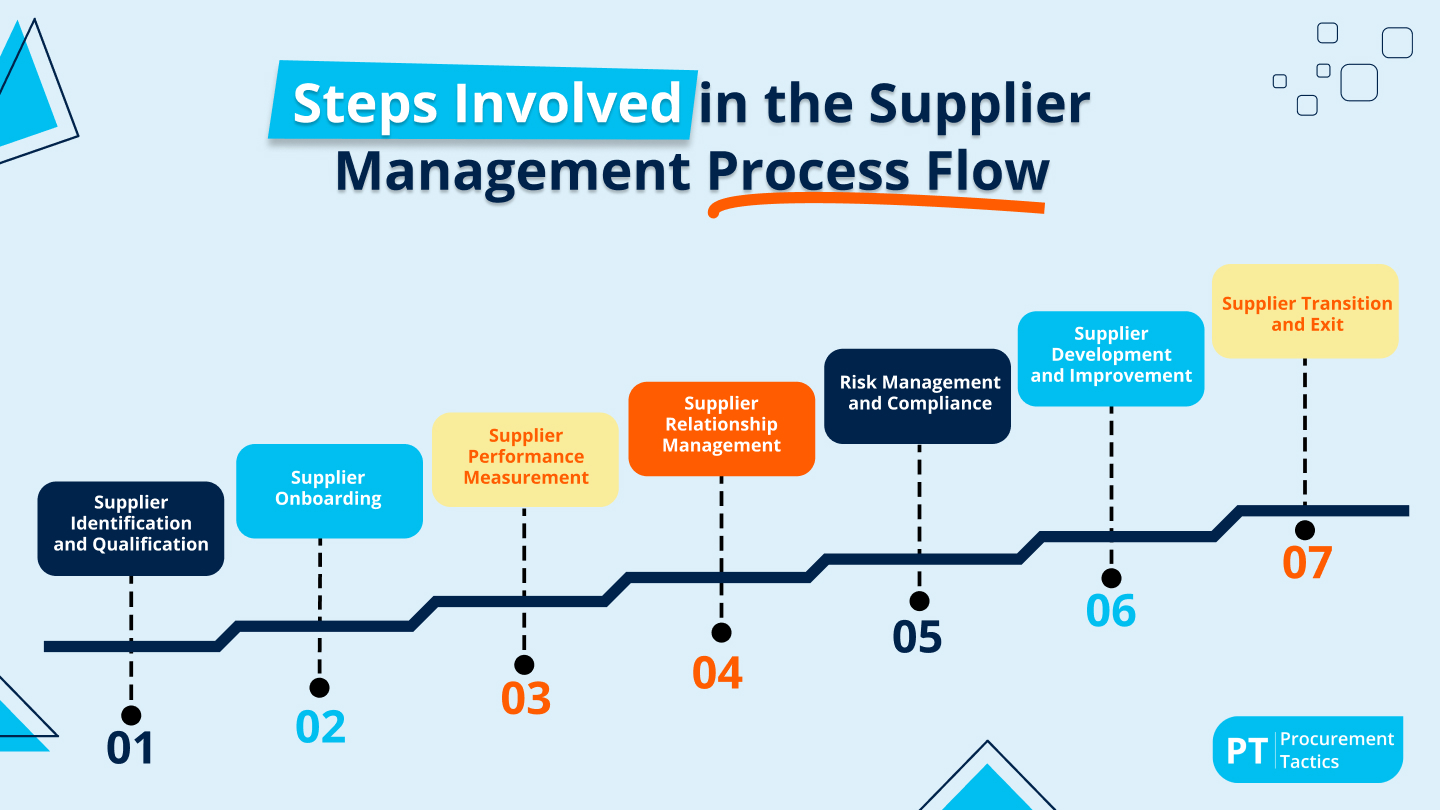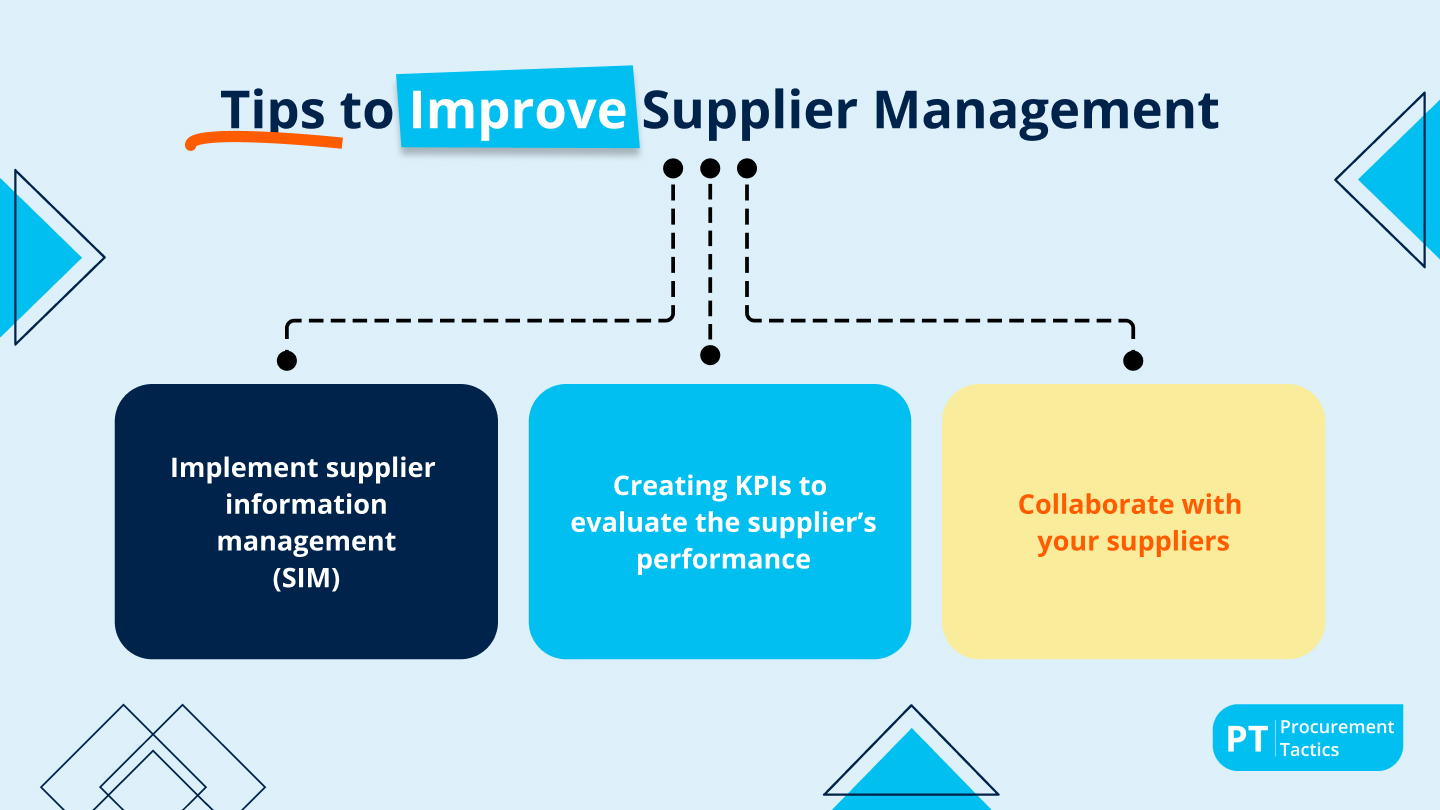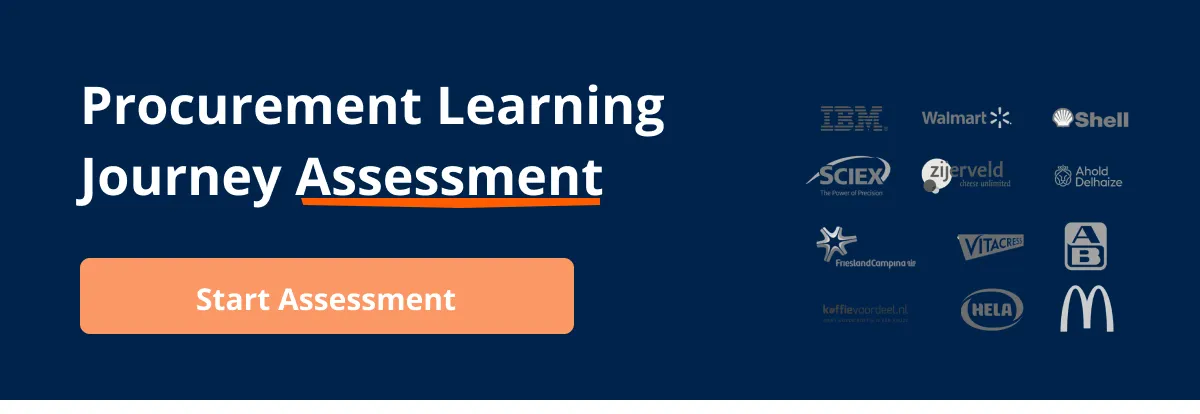Written by Marijn Overvest | Reviewed by Sjoerd Goedhart | Fact Checked by Ruud Emonds | Our editorial policy
Supplier Management — Your Ultimate Guide in 2024
Key takeaways
- Supplier management is a strategic process that involves managing and enhancing interactions with the organization’s suppliers to ensure they deliver maximum value.
- Supplier management includes seven steps for creating an efficient system that manages suppliers.
- Efficient supplier management helps an organization achieve cost savings, manage suppliers well, and improve transparency.
Supplier management is important for any organization dealing with a lot of suppliers. This is needed to maintain supplier relationships properly. However, this won’t be easy for most organizations.
This article will define supplier management and understand its importance in organizations. Additionally, we will illustrate its processes and benefits. This will include tips on maintaining and improving supplier management in your organization.
Once you are finished with this article, you will be able to incorporate all the learnings you’ve gained into your organization and improve the current supplier management, allowing your organization to grow to its potential.
I have created a free-to-download editable supplier relationship management scorecard template. It’s a PowerPoint file that can help you assess your supplier’s performance to manage them efficiently. I even created a video where I’ll explain how you can use this template.
What is Supplier Management?
Supplier management refers to managing the created relationship between the organization and its preferred supplier or groups of suppliers. Its main function is properly handling the suppliers and improving their impact on the organization’s development.
To do this, suppliers’ strengths and capabilities must be evaluated, before honing their skills holistically, which are a few of the functions of supplier management. Additionally, supplier management handles and improves interactions with the organization’s suppliers, allowing for growth between both the organization and the supplier.
Why is it Important?
The organization mainly relies on the goods and services the suppliers provide them. It is only obvious why having a strong relationship with your supplier is important. That is because the organization’s success depends on the supplier’s ability to meet demands and deliver goods on time.
However, many organizations create problems for themselves due to a lack of supplier relationship management and strategic sourcing.
Supplier management allows the organization to know potential performance issues, practice open communication, and ensure that the suppliers support the organization by complying with the requirements.
What are the Steps Involved in the Supplier Management Process Flow?
Here are the steps to guide you in the Supplier Management Process Flow.

1. Supplier Identification and Qualification
Before anything else, the organization must identify potential suppliers that meet their requirements. To do this, the organization should have a criterion on what it’s looking for in a supplier.
Organizations may evaluate suppliers based on specific criteria such as quality, reliability, cost, capacity, and reputation. Once the organization has set its criteria, it can now choose which suppliers can meet their needs and goals.
In my experience as a procurement manager of Ahold Delhaize and Royal Friesland Campina, this step is more complex than it seems. Finding suitable suppliers is extremely important. There are various ways to find suppliers. The two best methods, in my opinion, are attending trade fairs and identifying which suppliers potential competitors use.
2. Supplier Onboarding
After identifying the suppliers the organization wants to work with, it’s time to establish contractual agreements with them. It should outline the terms and conditions, pricing, delivery schedules, and quality standards.
Aside from these, the organization needs to gather the necessary documents such as supplier contracts, insurance certificates, and compliance certifications. Additionally, initial training sessions must be conducted to let the suppliers familiarize themselves with the organization’s policies and procedures.
3. Supplier Performance Measurement
The supplier management process flow does not stop after identifying and onboarding the suppliers. The organization must continuously aim to improve its suppliers to meet the dynamic demands of the industry.
The organization must define its KPIs or key performance indicators such as quality, delivery, responsiveness, and cost. Suppliers must be regularly assessed using these indicators through performance reviews, audits, and feedback mechanisms.
Moreover, the organization should communicate and collaborate with suppliers to address existing or potential issues and deficiencies.
A good way to implement structured supplier performance management is to establish a quarterly business review, along with a standard deck that includes key performance indicators such as revenue and service level
4. Supplier Relationship Management
To maintain the same quality of goods and services provided by the organization’s suppliers, it’s important to implement supplier relationship management. Supplier relationship management creates relationships based on trust, collaboration, and communication.
Doing so entails the organization to address supplier concerns, resolve issues, and share feedback. The organization and supplier must also collaborate to create joint product development, reduce costs, and instigate improvements.
5. Risk Management and Compliance
Risks are commonplace no matter which industry one sets foot on. It’s no different in supplier management and procurement in general. The organization should, therefore, be able to identify potential risks in their supplier relationships to prevent further problems.
For one, implementing risk mitigation strategies can minimize the impact of risks associated with suppliers. Other methods include ensuring suppliers comply with relevant laws, regulations, industry standards, and ethical guidelines.
6. Supplier Development and Improvement
There is no doubt suppliers should also improve if the organization wants to improve as well. The quality of goods and services delivered, and supplier performances are relevant to an organization’s success. In this case, organizations should provide support and resources to help suppliers improve overall.
The organization can offer training, guidance, and practices to help suppliers enhance their capabilities and performance, meet quality standards, and innovate. There should be regular feedback, performance reviews, and collaborative problem-solving to continue this.
This is also a very important aspect. The better a supplier understands what is important to you as a retailer, the better the collaboration will be. To achieve this, you really need to collaborate and organize your organization accordingly. A great example of how I did this is in the collaboration on online retail.
This requires something different from an organization than more traditional/offline retail, and it is precisely here that you need to align with each other. Assisting suppliers in understanding this game well ultimately helps you achieve good results.
7. Supplier Transition and Exit
Organizations should assess the suppliers’ relevance, performance, and alignment with organizational goals. They should also know changes in the dynamic market necessitate transitioning to new suppliers to end existing relationships.
Therefore, the organization is entitled to plan and execute these transitions smoothly to ensure minimal disruptions.
The Benefits of an Effective Supplier Management
With effective supplier management, an organization can gain many benefits, which are listed here:
1. Achieve cost savings
Strong supplier management will enable the organization to find cost-saving opportunities in the supply chain. It drives a new level of efficiency and productivity by allowing for smooth supplier connectivity and collaboration.
Moreover, incorporating good supplier management can reduce availability, delays, and quality issues on the organization’s end, leading to better customer service. This leads to more profit for the organization because this will encourage people to buy more products.
2. Manage a growing supplier base effectively
It is not a surprise that most organizations have many suppliers. This means they need to deal with them simultaneously. This can be especially daunting if there is a big and growing supplier base. With a well-structured supplier management, the management becomes smoother and the organization can handle multiple suppliers without compromising quality.
For instance, Unilever, known for its diverse products ranging from cleaning agents to food and beauty products, restructured its supplier management by bringing supply chain specialists. Now, they keep track of their multiple suppliers and supply chain effectively and efficiently.
3. Improve transparency
A supplier management system will allow the organization to streamline information and data regarding the life cycle of the suppliers. Since having a supplier management system entails both the cooperation of suppliers and the organization and their feedback and input, it will enable organizations to have transparency with the number and type of suppliers they engage with.
4. Evaluate supplier performance
The organization’s market success is dependent on the supplier’s performance. For this reason, the organization needs to monitor and evaluate its supplier’s performance regularly. Supplier management will allow the organization to assess the supplier’s compliance and give insights into their performance.
5. Lessen the supplier risk
Efficient supplier management can help find and evaluate the impact of supplier risks, and create appropriate risk mitigation measures. Through countless evaluations and feedback between organizations and suppliers, both parties can identify their shortcomings and develop ways to improve them. This includes risks associated with suppliers.
3 Tips to Improve Supplier Management
These 3 tips are significant in your Supplier Management journey so make sure to pay them close attention.

1. Implement supplier information management (SIM)
Implementing supplier information management will enable an organization to streamline supplier data.
This can give the organization meaningful insights into the suppliers’ performance and carefully evaluate them.
This can also help the organization monitor the suppliers’ capabilities, and create strategies to mitigate supplier risks.
2. Creating KPIs to evaluate the supplier’s performance
Key performance indicators (KPI) enable supplier performance measurement to assess value-creation and find the problem, allowing the organization to improve suppliers and the company itself.
3. Collaborate with your suppliers
The organization must ensure that it has communicated its objectives and goals coherently to its suppliers. When the suppliers understand what is needed, they can offer valuable propositions.
Supplier relationship management can be the key to deriving maximum value from the suppliers to make the organization’s supply chain work efficiently.
Procurement Expert’s Advice on Supplier Management
For this article, we asked a seasoned procurement professional to share his insights regarding supplier management.
Sjoerd Goedhart
Owner, Goedhart Interim Management & Consultancy
LinkedIn Profile: https://www.linkedin.com/in/sjoerdgoedhart/
1. Can you share a personal example of supplier management? What can readers learn from this?
“During the recent Ukraine crisis, a lot of companies became out-of-stock in some essential raw materials. Existing suppliers could only continue delivery if increased prices are paid.
Especially in the example of out-of-stock raw materials, it is essential to have alternative suppliers approved and available to deliver to minimize the effect of nonavailability of raw materials.”
Follow-up Question: Your example shows the importance of having alternative or multiple suppliers. However, what if there is only one supplier that supplies your needed materials (sole sourcing)? What is your advice for procurement professionals who are facing this kind of situation?
“In a situation where there’s only one supplier for the needed materials, it’s crucial for procurement professionals to establish clear expectations, KPIs, and conditions that the supplier must meet.
This includes outlining service levels and adhering to quality regulations. Additionally, implementing short-term contracts allows for regular evaluations and provides an opportunity to renegotiate terms if necessary.
By maintaining proactive communication and leveraging contract flexibility, procurement professionals can effectively manage the situation despite having only one supplier.”
2. What should readers know about this supplier management?
“Good supplier management always saves money because suppliers know that alternative suppliers have been approved and are ready to deliver.
In addition, good supplier management also provides alternatives if incidents occur in the supply chain to ensure that the manufacturer experiences little or no inconvenience from a disrupted supply chain.
If you, as a manufacturer or retailer, have this done well, it gives you an advantage over your competitors.”
Follow-up Question: What obstacles have you faced when implementing or maintaining effective supplier management? How did you overcome them?
“One common obstacle in implementing or maintaining effective supplier management is workload constraints within the organization. Often, there isn’t enough time to dedicate to supplier management qualitatively, leading to shortcuts or compromised efforts.
To address this, it’s essential to communicate the workload challenges to management and advocate for additional resources or support. However, in some cases, adding extra manpower may not be feasible.
In such instances, it’s crucial to establish clear priorities and align them with management expectations. Setting priorities ensures that efforts are focused on the most critical tasks.
Additionally, regular communication with management helps to ensure alignment and avoid potential conflicts over task completion.
Ultimately, successful supplier management requires navigating internal politics and ensuring that agreed-upon priorities are delivered upon effectively.”
3. What is the biggest misconception about supplier management? What do most people get wrong about it?
“Supplier management, and especially the selection and alignment of alternative suppliers, costs time and money, which can also be used to strengthen the relationship with existing suppliers. Good supplier management is essential to ensure the supply of goods and have the best prices.”
4. How can businesses effectively assess and manage supplier performance to ensure quality and reliability?
“To set clear KPIs for what suppliers should deliver. Share the KPIs with the suppliers and track and evaluate them several times during the year.”
5. Can you give some tips on how one can manage their suppliers well?
“Having a supplier management system that is used by all procurement professionals. Important to do e.g. target setting for the professionals to ensure that supplier management is a structural part of the daily activities and that the supplier management system is actively maintained.”
6. How can software or tools help procurement professionals determine the supplier that suits them the most?
“It helps to have good software tools available to keep all supplier data up to date and insights, as well as the performances of existing suppliers. Together with tools to compare and benchmark cost prices, this makes it possible to efficiently manage suppliers’ performance and select suppliers that best suit the manufacturer’s objectives, both in terms of quality and/or price.”
Conclusion
In essence, the significance of supplier management in procurement cannot be understated. It is the linchpin sustaining operational efficiency, ensuring resource availability, and fostering collaborative, mutually beneficial partnerships.
An adept supplier management system is the cornerstone of success as it optimizes the overall value chain. As organizations navigate the complexities of the business landscape, the judicious cultivation and management of supplier relationships emerge as a strategic imperative, empowering procurement professionals to secure sustained success in an ever-evolving marketplace.
Frequentlyasked questions
What is Supplier Management
Supplier management refers to the process of handling and improving interactions with the suppliers or vendors of the organization.
Why is Supplier Management important?
It is important to assess the performance of your suppliers as the performance of the organization is dependent on theirs.
What are the benefits you can gain from Supplier Management?
Implementing supplier management will allow the organization to achieve cost savings, manage many suppliers, improve transparency, and evaluate the supplier’s performance.
About the author
My name is Marijn Overvest, I’m the founder of Procurement Tactics. I have a deep passion for procurement, and I’ve upskilled over 200 procurement teams from all over the world. When I’m not working, I love running and cycling.


